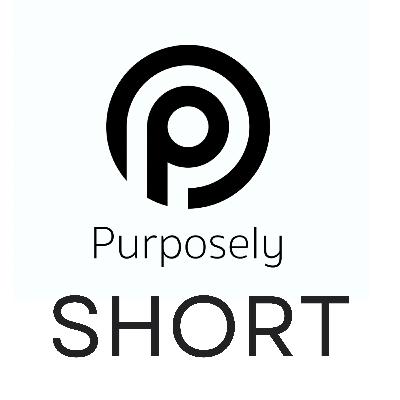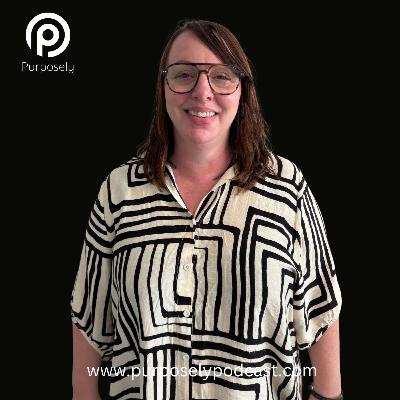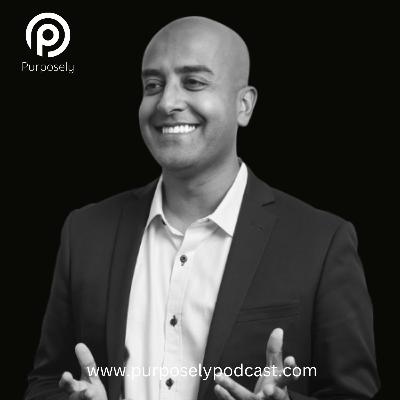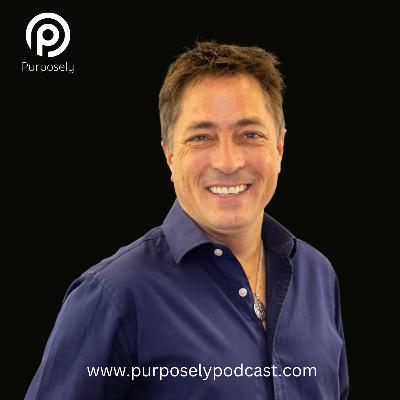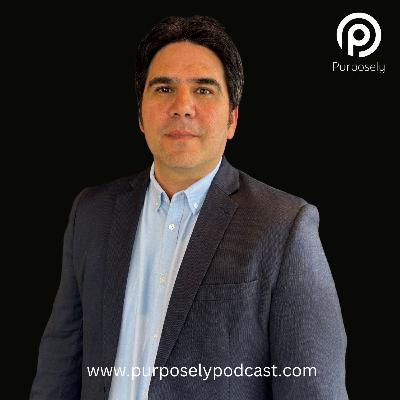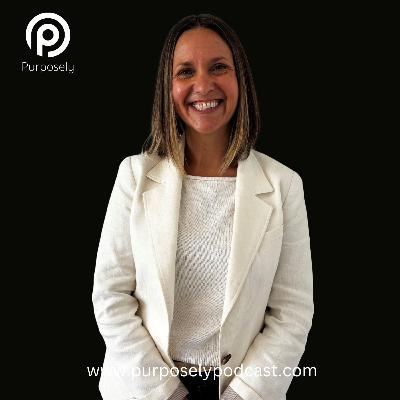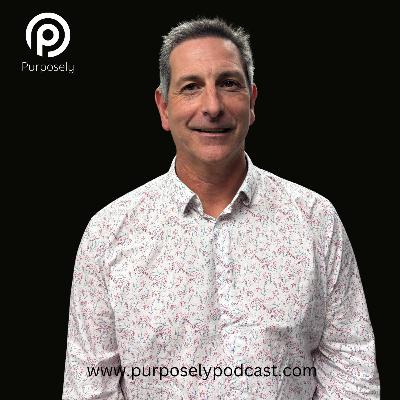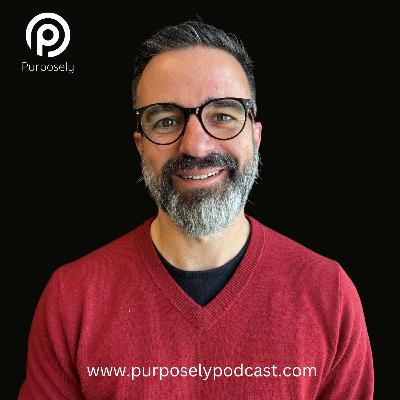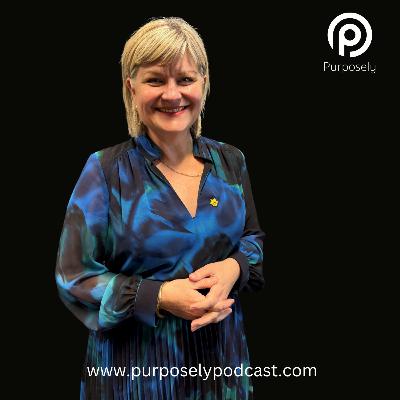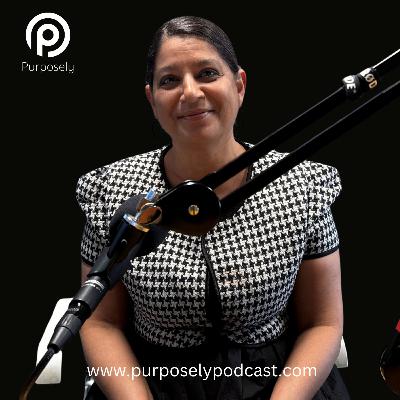Discover People Inspired By Purpose - Purposely Podcast
People Inspired By Purpose - Purposely Podcast

People Inspired By Purpose - Purposely Podcast
Author: Mark Longbottom
Subscribed: 24Played: 1,119Subscribe
Share
© Mark Longbottom
Description
Speaking with people of purpose, those making the world a better place
People Inspired By Purpose - Purposely Podcast amplifies the stories of inspirational people from across the Globe, philanthropy leaders, founders and CEO's of nonprofits, charities, for purpose business leaders as well social entrepreneurs. They are often inspired by their own experiences.
Join the Purposely team www.purposelypodcast.com
People Inspired By Purpose - Purposely Podcast amplifies the stories of inspirational people from across the Globe, philanthropy leaders, founders and CEO's of nonprofits, charities, for purpose business leaders as well social entrepreneurs. They are often inspired by their own experiences.
Join the Purposely team www.purposelypodcast.com
372 Episodes
Reverse
Welcoming Annette Presley to Purposely Podcast, we hear how a career defined by entrepreneurship has evolved into a focus on philanthropy, with a commitment to creating opportunities for young women and communities.In this conversation, Annette shares:Her early experiences in business, when female role models were rare and breaking through as a woman was a significant challenge.The influence of her grandmother, whose belief in her became a driving force, and why support and encouragement are essential for young women to thrive.Her views on education reform, including the need to equip young people with practical skills such as financial literacy, resilience, and public speaking.Why she launched the Dream Foundation and how she applies her entrepreneurial mindset to set measurable goals, build strong partnerships, and ensure accountability.Annette’s story is one of hustle, determination, disruption, and a belief that lasting change requires more than good intentions. Through her foundation, she is working to open doors for others and create practical, measurable impact in communities across New Zealand.
Welcome to Purposely Short, a weekly episode, featuring one of our friends or past guests and their expertise on a certain topic. This weeks episode features Angus Crowther co-founder of Tanck.
Angus shares how they help nonprofits and 'for purpose businesses' to communicate effectively with government officials. How ability to do this can positively effect your ability to make a positive impact and increase their reach.
Episode highlights:
- 'Providing technical details as well as a compelling narrative and a narrative arc is important'
- Data important and can grab the attention of politicians
Quote: 'Remember politicians are competing with the Kardashians for eyeballs on twitter'
Based in Australia... although still relevant in other parts of the world Tanck's mission is to empower purpose-led organisations by providing the know-how and the strategy for impactful government engagement.
Tanck is B Corp certified consultancy firm is on a mission to level the playing field by countering the influence of lobbyists and private interests that often shape policy decisions.
United by their shared dedication to positive change, Angus Crowther and (co founder) Neil Pharaoh are reshaping the dynamics of government engagement for nonprofits.
Welcome to Purposely Short, a weekly episode, featuring one of our friends or past guests and their expertise on a certain topic. This weeks episode features Philippa Charles on what a charity needs to succeed as well the value she puts on fundraisers.
Since its inception in 1958, the Garfield Weston Foundation has donated close to a billion pounds to good causes in the UK, granting between seventy and hundred million pounds annually.
Despite the size and importance of the foundation's financial resources, Philippa Charles, its leader, is known for her accessibility, humility, and empathy. She is renowned for being a straight talker and has a desire to keep things simple.
The foundation was set up by the Weston Family to benefit from the proceeds of their successful businesses, which include well-known brands in the food industry. These brands range from high-end retail, such as Fortnum and Mason, to household staples like Tip Top Ice Cream in New Zealand.
This episode of Purposely is a little different.Instead of hosting the conversation, Purposely host Mark Longbottom is the one being interviewed — joining Azoora Ali on her podcast Care Beyond Profits. It’s a generous, wide-ranging conversation that gives listeners a chance to hear more about the story behind Purposely, the experiences that shaped Mark’s work, and the values that continue to guide him.Azoora takes Mark back to his early years growing up on Auckland’s North Shore, his long stint in the UK charity sector, and the journey that eventually led to the creation of Purposely Podcast. They talk about why Mark believes motivation is often overrated, and why consistency - especially when it’s scheduled - matters far more than waiting to feel inspired.The conversation also touches on health, wellbeing, leadership, and the balance between empathy and accountability. Mark reflects on what more than 260 interviews with purpose-led leaders have taught him about service, happiness, and the importance of clarity, even when leaders don’t have all the answers.Mark also shares insights from his role as Head of Community Engagement at Trust Investments, and his work connecting charities and for-purpose organisations with investment solutions that align financial performance with social and environmental impact.This episode offers an honest look at the thinking behind Purposely, the disciplines that sustain purpose-led work over time, and why serving others often brings deeper meaning to both leadership and life.A big thank you to Purposely sponsors Benevity and Trust Investments for supporting the podcast, and to Azoora Ali.
This episode is a little different.I recorded it while away at the beach with my family, fitting it in between swims, time with the kids, and the usual holiday chaos. Instead of the usual interview, this is just me taking a moment to reflect on the past year of Purposely Podcast and some of the themes that kept coming up.2025 was a big year for the podcast. We recorded 49 episodes and are closing in on 300 in total since Purposely began in 2020. This episode is a pause rather than a performance. A chance to share what stood out, what I have learned, and what feels worth carrying forward.One of the questions I ask in every interview is about mission and purpose. It has become increasingly clear to me that organisations with real clarity on why they exist tend to do better. They raise funds more effectively, motivate their teams more strongly, and stay focused on the impact they are trying to have. That clarity acts as a north star, especially when things get tough.I also share some thoughts on what it has meant to hear from listeners and see the podcast grow. The feedback, messages, and ongoing engagement really matter to me and help shape where the podcast goes next.A strong theme this year was the value of lived experience in leadership. Two conversations that stayed with me were with Nicola Coombe, CEO of the Cancer Society of New Zealand, and Shaun Robinson, CEO of the Mental Health Foundation. Both spoke openly about how their own experiences shape the way they lead and the empathy they bring to their roles.Another recurring topic was shared leadership and the rise of co-CEO models. Conversations with Alison Goodman from Noah’s Ark Children’s Hospice and Dean Hegarty from the Responsible Investment Association Australasia showed how well these arrangements can work when there is trust, complementary skill sets, and very little ego.I also reflect on the growing interest in venture philanthropy. In a difficult funding environment, conversations with Mary Rose Gunn from The Four and Izzy Horrocks from the Aotearoa Life Course Fund highlighted new ways of supporting early-stage organisations and social entrepreneurs, and why understanding how funders think is becoming increasingly important.This year I also hosted a number of in-person events, bringing together people from the investment world and the for-purpose sector. One thing I have become more convinced of is that as technology and AI make information easier to access, human connection becomes more valuable, not less. Meeting in person, learning together, and building relationships still matter.Towards the end of the episode I share a personal story about discipline and consistency. It is a reminder that change does not usually come from big gestures, but from small actions repeated over time.Thank you for listening and for supporting Purposely Podcast through 2025. I am really looking forward to what is coming in 2026, with more conversations, live events, and some new formats as the podcast continues to evolve.Some reflections from the yearThemes that stood out in 2025Connection still mattersA personal reflectionLooking ahead
This episode of Purposely was recorded live at a CEO roundtable in Auckland, bringing together leaders from across Aotearoa’s charity and for-purpose sector to explore one of the biggest questions facing organisations right now: how to use AI well, without losing the human heart of the work.Hosts Dr Kirsty Agar-Jacomb and Mark Longbottom is joined by Dr Megan Blakely from the University of Canterbury, whose research focuses on human-centred AI. Rather than talking about technology for its own sake, Megan challenges leaders to think about AI as a tool for augmentation, not automation, and to stay focused on people, trust, and wellbeing as adoption accelerates.The conversation moves beyond theory into the practical realities charity CEOs are facing. Megan discusses how AI is already showing up in areas like fundraising and health data, and why leadership matters more than ever when it comes to transparency, ethical decision-making, and psychological safety. She also unpacks the tension many organisations feel between legal compliance and ethical responsibility, and why meeting the rules is only the starting point.This live discussion is part of a series of impact lunches hosted by Mark Longbottom, designed to create space for honest, off-the-record conversations among charity leaders about emerging issues shaping the sector.A big thank you to Foundation North for hosting the roundtable and bringing together CEOs from across New Zealand’s charity community.Thanks also to Trust Investments and Benevity, the ongoing sponsors of the Purposely Podcast, for supporting conversations that sit at the intersection of purpose, leadership, and impact.
In this episode of Purposely Podcast, Mark Longbottom talks with Georgina Camp, co-founder of Huber Social, and Michelle McCaskill, the organisation’s CEO in Aotearoa. Both are leading voices in the move toward social impact measurement that actually helps communities instead of adding more admin.Georgina starts by explaining Huber Social’s purpose: to help people live well, and to support organisations to understand what truly makes a difference. Instead of counting outputs or filling in forms for the sake of it, their work focuses on listening to people’s experiences and keeping wellbeing at the centre. Good measurement should guide decisions, shape funding, and change as communities change.Mark raises a familiar tension for charities: proving impact versus understanding it. Georgina and Michelle talk about how a well-designed measurement approach can reduce workload rather than increase it. They work with the people affected, the funders, and the teams delivering services to create frameworks that reflect what matters most, not just what is easy to collect.Huber Social’s framework blends how people feel about their lives with practical indicators like health, resilience, relationships, and access to resources. It is flexible, grounded, and often uncovers issues that sit outside an organisation’s direct control but still influence whether someone can thrive.Michelle shares what it is like to lead Huber Social in New Zealand. She talks about building a remote team and forming partnerships around the country. She also highlights the Hauraki Opportunity, a recent project involving several communities coming together to define wellbeing on their own terms. It is a good example of measurement turning into real action instead of just another report.Both guests describe a shift happening in the sector. There is less emphasis on admin ratios and more interest in whether organisations genuinely improve people’s lives. Funders are also becoming more open to supporting wider issues that appear in the data, even when they fall outside an original project scope.The episode finishes with Michelle’s personal journey into social impact. She moved from innovation-focused business roles into work driven by purpose and community. She encourages anyone who wants to learn more to reach out through Huber Social’s platforms and be part of the wider conversation about measuring what matters.
We’re revisiting one of the early Purposely episodes, a conversation with Steve Wickham, founder of The Giving Department (which is till going strong) and a long-time leader in philanthropy, corporate responsibility, and social impact.Steve has spent more than two decades helping companies and philanthropists connect their resources with the people and organisations that need them most. Before launching The Giving Department in 2010, he held senior roles at Macmillan Cancer Support and The King's Trust (then the Prince’s Trust), shaping programmes that enabled businesses and donors to support young people and communities across the UK.How he made the jump from major national charities to starting his own social-purpose business.Why he built The Giving Department as a for-profit impact company, and what that model makes possible.The early projects that put the business on the map, including corporate partnerships that changed how companies think about doing good.His belief that generosity starts with people, not campaigns and why personal connection still drives most giving.Lessons from his time at The King’s Trust and Macmillan, including what strong partnerships look like behind the scenes.The influence of his family, particularly his late father, on his approach to work, kindness, and community.The pressures charities face today and why some organisations will adapt while others won’t survive.Steve’s blend of experience, honesty, and practical insight still lands today. The conversation strips philanthropy back to what really matters: relationships, trust, and people showing up for each other.
In this episode of Purposely, we sit down with Carey Church, Managing Director of Moneyworks, for a conversation about what ethical financial advice looks like in practice. Carey has been quietly shaping this space in New Zealand for nearly three decades, focusing on understanding people’s lives and values before talking about their money. Her approach is practical, people-centred, and built on years of working closely with clients as their needs and expectations have changed.We talk about:How Carey built Moneyworks around holistic, values-aligned financial planningWhy ethical investing isn’t about purity, but about informed decisionsThe role of trust and mutual respect between adviser and clientThe practical process Moneyworks uses to personalise ethical investment portfoliosThe increasing importance of financial literacy and intergenerational planningWhy Moneyworks became a B Corp, and what it actually means in practiceHow Carey is approaching life and leadership in her 60s, including a four-day work week and tighter focus on what really mattersWhether you're curious about ethical investing or simply want to understand what good financial advice looks like, Carey offers a candid, grounded perspective shaped by real-world experience.
Welcoming Kirsten Kilian-Taylor, Head of Philanthropy at Perpetual Guardian, to Purposely Podcast. Kirsten oversees more than $40 million in grants each year, working with hundreds of donors and charities to help drive meaningful change across Aotearoa. Her role is all about careful stewardship, not just managing funds, but making sure legacies, some over a century old, are still supporting real needs today.Philanthropy can be daunting when so many people and organisations need support. Kirsten says the key is to stay true to what donors care about while making sure their giving works in today's world. “Our mission is wrapped around stewardship,” she explains. Perpetual Guardian started with wills and estates, but now it works with people who want to give while they’re still here to see the difference it makes.Kirsten encourages people to start giving while they're still able to experience the impact firsthand. “Nine times out of ten, people already have a passion they want to support,” she says. Her role is to help that spark grow, whether it’s through scholarships, community projects, or less visible support like covering transport or uniforms to remove practical barriers.Perpetual Guardian’s sustainability is built on careful investment of capital funds, with grants powered by income. The organisation has shifted from solely managing funds to providing broader philanthropic advice, using sector insights, networks, and technology to make giving more effective. “We handle the compliance and administration so our donors can focus on what matters to them,” Kirsten says.In 2020, Perpetual Guardian brought Givealittle under its wing, a move Kirsten describes as a natural fit. The platform has so far generated more than $300 million in crowdfunding for causes across New Zealand. “Givealittle provides an entry point to generosity,” she says. “Anyone can give directly to a cause that speaks to them, and that’s powerful.”But it’s not all smooth sailing. Kirsten highlights the increasing pressure facing charities: rising demand for services, more competition for funding, and a government funding model that hasn’t kept pace. “We’ve seen application numbers double in some areas while funding stays the same,” she notes. Her advice for organisations seeking funding: stay true to your mission, build strong governance, and be adaptable.Kirsten also points to a shift in philanthropy—toward supporting capacity-building and operational needs, not just projects. Funders are moving cautiously, but there’s growing recognition that organisations need support to thrive long-term.Her personal journey into philanthropy started in Gisborne, shaped by community values and a formative student exchange in the Canadian Arctic. Now based in Wellington, she sees her role as creating space for people to connect with causes that matter. “My job is to make people feel comfortable pursuing their philanthropic goals,” she says. “I’m a connector at heart.”As philanthropy continues to evolve—driven by changing values, emerging generations of donors, and increasing interest from corporates, Kirsten stresses the need for authenticity. “If corporates want to offer philanthropic services, they need to back it up with real engagement—not just a PR strategy.”Kirsten sees huge potential in New Zealand’s philanthropic landscape: a mix of deep generosity and a small, agile system. “We’re small enough to test new ideas and see results quickly,” she says. She also calls for stronger collaboration between government and philanthropy to address big issues like health, housing, and education.A big thank you to episode sponsors Benevity and Trust Investments
This special live episode of Purposely Podcast was recorded in Auckland at a Place-Based Impact Investing event co-hosted by Brightlight and Trust Investments.Samuel Richards, Managing Director at Brightlight, joins me to discuss how purpose and investment can come together to deliver better outcomes for people and places. He talks about Brightlight’s journey, how it began, the challenges along the way, and what it takes to build an organisation that’s both commercially strong and values-driven.A central theme of the conversation is the Te Puna Hapori Community Infrastructure Strategy - Te Puna Hapori meaning “spring of wellbeing.” The strategy aims to help create safe, warm and healthy communities where people can live, learn and thrive. It focuses on the types of essential community assets — social, educational and health infrastructure — that are often underinvested in across regional Aotearoa New Zealand.Developed through a partnership between Trust Waikato and Brightlight, Te Puna Hapori seeks to unlock opportunities for wellbeing and resilience through targeted investment. The approach allows capital to flow into projects that deliver tangible, long-term benefits for communities, with investment options available through both fund and bond structures.Samuel is joined by:Dennis Turton, CEO of Trust WaikatoSimba Marekera, Head of Global Private Assets, BrightlightTim Symons, Brightlight NZTogether, they explore how global impact investing ideas can take root in Aotearoa, New Zealand and how capital, partnerships and community can work together to achieve meaningful, lasting outcomes.
In this episode of Purposely Podcast, Simon Fulford, Executive Director at Parrott Creek in Oregon, talks about leadership, community, and making change that lasts.Parrott Creek supports young people facing tough circumstances, combining therapeutic care with community-based programmes. Simon’s approach is shaped by years of working with youth and families in the UK, New York, and now the Pacific Northwest.He believes leadership is about staying steady when things get hard and making sure purpose shows up in everyday work. The new $29 million residential campus is a major milestone, but Simon says the real test lies in delivering programmes that match the promise of the space.He also talks about the realities nonprofits face - funding cuts, mergers, and the challenge of holding on to identity through it all. His focus is on keeping Parrott Creek nimble, learning from other sectors, and protecting the relationships and trust that make the work possible.Simon’s story crosses continents, but his focus remains constant: do the work, stay connected, and keep improving.
In this episode of Purposely Podcast, we are joined by Seumas Fantham (Ngāti Porou, Whakatōhea), Chief Executive of the Todd Foundation.We talk about how philanthropy can move beyond forms, reports and checkboxes — towards something built on trust, honesty, and shared learning.Seumas is clear that effective giving isn’t about having all the answers. It’s about building real relationships, being open to challenge, and making it safe for partners to be upfront when things don’t go as planned.At the Todd Foundation, that thinking has shaped their approach to funding. Since 2009, they’ve supported community-led initiatives through long-term, high-trust partnerships — untagged funding that gives organisations the space and confidence to lead their own work. Seumas explained that this approach recognises the natural ups and downs that come with running a community organisation — leadership changes, internal challenges, or times when things simply feel tough. Rather than stepping away, the Foundation looks to stand alongside their partners and, when needed, work with other funders to help them through.We also talked about the culture change required for funders — to move from being grant-makers to genuine partners. It takes humility and a willingness to listen. For Seumas, that’s the real heart of effective philanthropy.Away from the office, Seumas stays grounded through whānau and the small moments that bring perspective — like sharing a chocolate fish with his daughter. It’s a reminder, he says, of what truly matters and the kind of presence he brings to his work.Seumas’s reflections are a timely reminder that good funding is built on trust, not control — and that lasting impact starts with genuine partnership.
Welcoming Geneva Loftus, Executive Director of Move92, to Purposely Podcast.Geneva leads Move92 — a global philanthropic organisation on a mission to help local changemakers lead their own development. Their approach challenges traditional models of international aid by putting resources and decision-making power directly in the hands of those closest to the challenges.The organisation takes its name from a striking statistic: of the $10 billion in global gender equality funding, only 8% goes to organisations based in the countries where the work happens. Move92 exists to help shift that remaining 92% to the local leaders who know their communities best.In our conversation, Geneva shares her refreshing perspective on international development — what real impact looks like when it starts from the ground up, and how philanthropy can achieve more by doing things differently. We talk about shifting power, trust-based giving, and the importance of listening and learning from local partners.Now based in Christchurch, New Zealand, Geneva reflects on her multi-country life and career, from living with refugees on the Thailand–Burma border to advising funders and corporates across the US, Australia, Singapore, and beyond. With over 20 years’ experience spanning both large NGOs and grassroots organisations, she understands the subtle dynamics of both worlds — and what it takes to connect them effectively.At Move92, Geneva and her team connect philanthropists, family foundations, and corporates with grassroots organisations that align with their core values. Together they build purpose-driven portfolios that spark real-time impact and drive lasting change.Move92 also takes a wide view of gender equity, recognising that supporting girls and women includes working with boys and men too. Guided by their local partners, they focus on what communities need most — because when women thrive, communities thrive, and so does our planet.It’s an open, thoughtful conversation about rethinking philanthropy, following non-linear paths, and finding balance and purpose closer to home.
Welcoming Mark Weatherall, CEO of Life Education Trust, to Purposely.Mark Weatherall’s reflections on how New Zealand prepares young people for life are refreshingly down to earth. He talks openly about a familiar gap — that many young people, and even adults, haven’t built the knowledge, confidence or habits needed to navigate an increasingly complex world. “We got pocket money, we spent it, that was it,” he says, recalling his own upbringing. Today, with more pressures and distractions than ever, the challenge is helping the next generation make thoughtful choices that shape their futures for the better.Mark leads Life Education Trust, one of Aotearoa’s most recognisable and long-standing charities. After 37 years and reaching over 86% of schools, the Trust continues to evolve its mission of helping tamariki develop the life skills they need to make positive choices. Mark is realistic about what’s required to keep that work strong — supporting volunteers, maintaining local connections and securing sustainable funding are all priorities. “We need that local input,” he says. He believes centralising some functions, like fundraising or HR, could ease the pressure on volunteers, freeing them to focus on what matters most: supporting children and communities directly.Before joining Life Education Trust, Mark spent years leading some of New Zealand’s top sporting organisations, including canoeing and rowing. These are sports where success is measured in milliseconds, medals and the pride of representing Aotearoa on the world stage. He speaks candidly about the intensity of leading at that level, where every decision can influence an Olympic or Commonwealth campaign, and where legacy matters as much as performance.Mark also brought his leadership closer to home, heading Surf Life Saving New Zealand, a movement that combines competition, community service and coastal safety. It’s a cause close to his heart and reflects his lifelong love of the ocean, as well as his belief in sport’s power to build resilience, teamwork and purpose.Outside of work, Mark’s story is one of reflection and renewal. After a double hip replacement kept him from his usual pursuits — diving, fishing and time outdoors — he’s been rethinking what matters most. “How many useful summers have you got left?” a friend recently asked him. For Mark, it’s not about counting down, but about making the most of what’s ahead: staying active, enjoying family and finding balance between purpose and personal wellbeing.Mark’s approach isn’t about slogans or grand gestures. It’s about practical support, honest conversations and small decisions made well — both in leadership and in life. In a space often clouded by buzzwords, his clarity stands out: help young people build real skills, support those doing the work and keep the mission grounded in reality.
In this episode of Purposely, I’m joined by Joy Morozov, founder and director of Philanthropower, a consultancy that helps philanthropists and NGOs build trust-based partnerships that turn good intentions into real impact.Joy’s story is anything but ordinary. Born in Lebanon and raised across the Middle East, she grew up switching effortlessly between languages — now speaking more than five — and moving between cultures that didn’t always make space for women to lead. From a young age, she knew she wanted more than the life expected of her — so she pushed back, questioned limits, and carved her own path. That determination and curiosity have become her trademarks ever since.Her early career with the Financial Times and Thomson Reuters taught her the value of trust, brand integrity, and genuine connection. But after years in the corporate world, Joy felt an undeniable pull toward purpose. That calling led her to Light for the World, where she launched its UK chapter and learned first-hand that good intentions aren’t enough — real change comes from understanding what communities truly need and how to support them sustainably.Through Philanthropower, Joy now helps philanthropists and charities do exactly that. Her “MUST” framework — Mindset, Understanding, Strategy/Soft Skills, and Trust — captures her philosophy that effective giving starts with clarity, empathy, and relationships built to last.She speaks openly about what it takes to break into new markets, build credibility, and lead with conviction. Her success in the UK wasn’t luck; it was persistence, strategy, and an unshakeable belief that people give to people.Outside of work, Joy recharges through live music, travel, and the occasional off-grid retreat. Her journey — crossing cultures, sectors, and expectations — is a reminder that meaningful change takes both heart and rigour.
In this episode of Purposely, I’m joined by Jake Bailey, speaker, author, and now General Manager of Inspire Foundation, a charity backing the next generation of exceptional young New Zealanders.Jake first captured national attention as a teenager, delivering a heartfelt speech at his school prize-giving just days after being diagnosed with an aggressive cancer. That moment, and his remarkable resilience, inspired people around the world. But Jake is determined to be known for more than that chapter.Today, through his leadership at Inspire Foundation, Jake is focused on helping 15–23 year old's with outstanding talent across sport, arts, culture, and academia. The charity has supported more than 600 young people over the past 14 years, providing financial support, mentoring, wellbeing resources, and a community to help them thrive.We talk about:The lessons Jake learned from his own journey and why he’s focused on moving forward.The importance of authenticity and clarity in leadership and communication.How Inspire Foundation is making a difference for young New Zealanders and the vision for its future growth.This is a conversation about resilience, leadership, and purpose, an inspiring listen for anyone interested in how charities can unlock potential and create lasting impact.
In this episode we speak with Pablo Berrutti, Analyst at Stewart Investors and Co-founder of Altiorem, a nonprofit library created to strengthen the finance sector’s response to sustainability.Pablo shares how Altiorem grew from a simple idea into a living, evolving knowledge hub that pairs students with finance professionals to produce fresh insights. We talk about the challenges of building a sustainable funding model, the importance of keeping resources free and accessible, and why independence and integrity matter in financial education.We also touch on his interest in bringing Indigenous perspectives into financial thinking, recognising the value of wisdom from cultures that have cared for their environments for generations.For anyone working in finance, philanthropy, or the nonprofit world, this episode is both practical and inspiring. It’s about how knowledge, when shared openly and built with community, can drive real change.
Welcoming Nicola Coom to Purposely.Nicola Coom has just stepped into the role of CEO at the Cancer Society New Zealand. For her, cancer is not just a cause but a lived reality, her own BRCA1 gene diagnosis, her family’s history with the disease, and the choices she’s made to protect her health all shape the urgency she brings to leadership.Every day in New Zealand, 77 people are diagnosed with cancer and around 10,000 die each year. Access to medicines lags behind most OECD countries, and Nicola is determined to change that. She wants donor dollars to deliver real impact, patient voices to drive health policy, and investment in research and clinical trials to accelerate progress.In this episode, Nicola shares how personal experience has shaped her vision for the Cancer Society, why innovation and technology must be part of the solution, and how she plans to keep cancer at the top of the national agenda.Tune in to hear Nicola’s story, her bold plans for the future, and why urgency and lived experience are essential to reshaping cancer care in Aotearoa.
Welcoming Aisha Daji Punga, CEO of Toitū, to Purposely.Aisha is an experienced leader whose career has taken her across industries and sectors, from FMCG and telecommunications to health and wellbeing. She’s led major organisations, including her time as CEO of the Starship Foundation, and now heads Toitū, one of New Zealand’s most recognised names in sustainability and environmental certification. In our conversation, she shares how clarity, connection, and purpose shape her leadership—and why she’s energised by the toughest parts of the job.Her path to Toitū has been anything but linear. Alongside her executive leadership roles, she also ran her own consultancy. But what ultimately pulled her back into a CEO role was people. “I love being around people. I love being connected. I love teams,” she says. Consulting provided stimulation, but lacked the shared purpose and momentum that come from leading a group with a common mission. Returning to that environment was about aligning “head, heart, and soul”—the combination she says fuels her best work.That philosophy is clear in how she leads. Progress happens when teams move together. Alignment matters more than hierarchy, and clarity is the means to get there. “You have to be clear to be kind,” she notes—a mantra that underpins how she handles everything from strategy to day-to-day conversations. Feedback from her board reinforces that clarity and decisiveness are already shaping Toitū’s direction.From her first day, Aisha set out to listen. She spent months in conversation with clients, staff, and industry partners—not just to surface what was working, but to hear the harder truths. Those insights became the basis for resets and pivots, with a willingness to say, “this is where we need to go now.” For her, listening and alignment aren’t delays to action; they are what make action possible.Sustainability wasn’t her specialist field, but that has never been a barrier. She’s surrounded herself with scientists and subject experts who, she says, “astound and inspire me every day.” Her role isn’t to know everything, but to connect people, scale impact, and make Toitū’s purpose resonate widely. “I don’t need to be an expert,” she says. “I need a certain level of understanding, but I don’t need to be all things to all people.”What comes through in conversation is a style of leadership that avoids jargon and pretence. She doesn’t claim mastery of every detail; what she offers is authenticity, focus, and a commitment to the purpose at the centre of Toitū’s work. Success, for her, isn’t defined by accolades. It’s found in the energy of her team, the trust of stakeholders, and the impact Toitū can deliver in a rapidly changing world.Looking ahead, Aisha remains grounded: listen deeply, adapt quickly, and never lose sight of purpose. It’s a simple formula, but one that offers a powerful model of leadership for complex times—clear, connected, and unapologetically purposeful.Thank you to our sponsors Trust Investments



